'Northern Ireland is being left behind on assisted dying'
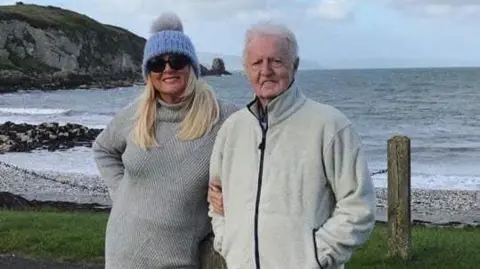 Handout
HandoutA proposed law to give terminally ill people in England and Wales the right to choose to end their life will be voted on by MPs on 29 November.
Polling suggests there is some public support for a bill and while the majority of MPs from Northern Ireland plan to vote against it at Westminster, assisted dying is not yet on the political agenda at Stormont.
Many religious organisations, disability rights groups and those within the medical profession believe an assisted dying law may be open to exploitation.
However Jill Crawford, who lost her dad Derek to dementia in 2019, is someone who wants to see the conversation around assisted dying begin in Northern Ireland.
"It’s a horrible thing to have to talk about but it’s a reality," Jill told BBC News NI.
"Northern Ireland is being left behind as normal. Somebody needs to just stand up and address it."
Her challenge to Northern Ireland Assembly members is to "stop hiding and brushing things under the carpet in the hope somebody else will pick it up".
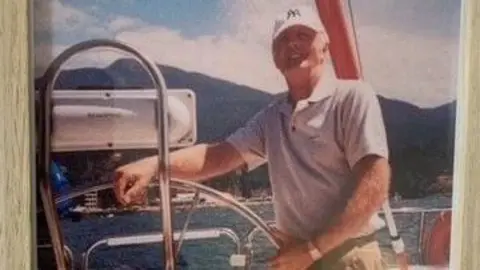 Handout
HandoutJill thinks politicians should consider a wider discussion in the debate around assisted death.
Reflecting on her dad's experience, she said: "How do you say to someone that has been diagnosed with dementia, are you ready to die?
"This has to be done beforehand, if it was me, it’s a choice I would make, definitely."
Jill said her dad would not have wanted to end up the way he did.
"He changed slowly from this vibrant, big man full of fun to in his last days lying like a corpse," she said.
"I wouldn’t want my family to have to look after me the way we did with dad, not because we didn’t want to do it but because it took everything from him."
'Do we value life or do we not?'
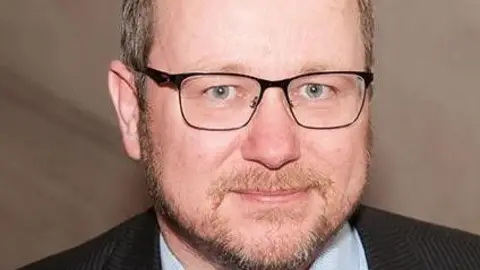 Handout
HandoutTim Cairns, from Christian Action Research and Education (CARE), is against an assisted dying bill anywhere in the UK.
"We need to make a choice - do we want to have an economic way forward or a way forward that increases and prolongs life?" he told BBC News NI.
"In every healthcare choice we make, we should try and do the thing that prolongs life - that’s better palliative care."
Mr Cairns is concerned the criteria for assisted dying legislation would be widened over time.
"When we look at the international experience in Canada, the Netherlands and Belgium, wherever it's been legislated for, the qualification for the procedure widens from very narrowly defined terminal illness to mental illness and disabilities.
"It comes down to this, do we value life or do we not?"
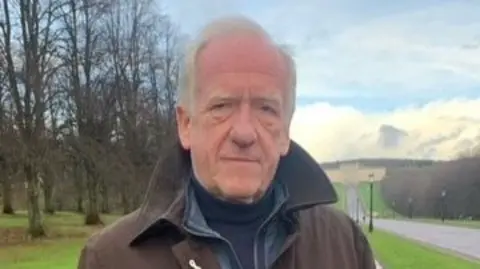
Gavin Walker, chair of campaign group My Death, My Decision, wants to bring an assisted dying bill to Stormont.
The group commissioned a poll in August, which said 67% of people support an assisted dying law to some degree in Northern Ireland.
"Up to this point I think people have just been trying to ignore the fact that it’s happening everywhere else and not happening in Northern Ireland," he said.
Mr Walker said discussions are needed to ensure the bill reflects what the people of Northern Ireland want.
"There are enough mechanisms... for MLAs to really start looking at this properly," he added.
'Mammoth change'
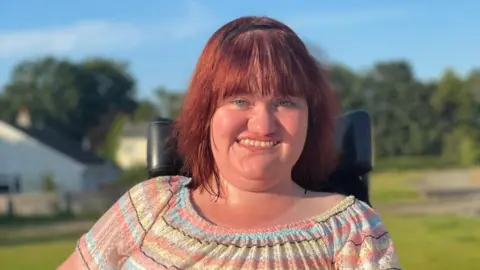 Michaela Hollywood
Michaela HollywoodMichaela Hollywood, from Northern Ireland, has spinal muscular atrophy (SMA), a genetic and degenerative condition which weakens muscles and impacts movement. She is a full-time wheelchair-user, is unable to sit-up unaided and her breathing muscles are paralysed.
Ms Hollywood isn’t in favour of the bill that is being brought before Westminster.
She said the bill would be an “absolutely mammoth change” and would be done “without the proper scrutiny and the proper time to have a proper discourse about it”.
“The public really do not grasp how wide ranging this is,” she said.
Ms Hollywood said the “protections for disabled people just are not enough”.
She added: “I have a lot of friends in Canada and seeing what they’re going through, it just makes me worried that we’re doing this the wrong way.
"What we need to be focussing on first is proper care, resourcing the NHS appropriately, and then we can have the discussion about what the right way is to provide choice, because there’s no choice without care, and at the minute we’re trying to do choice without care.”
She said the four UK nations need to come together on the matter and have a user-led commission set up.
What do politicians think?
Most of the MPs from Northern Ireland's political parties are planning to vote against the Westminster bill at its second reading on Friday.
That includes Sorcha Eastwood (Alliance), Robin Swann (UUP), Jim Allister (TUV), Alex Easton (Independent) and the DUP's five MPs.
SDLP MPs Claire Hanna and Colum Eastwood are still considering the bill.
The Alliance Party, SDLP and UUP say that assisted dying is a conscience issue for their representatives.
The DUP and TUV say their parties are against assisted dying.
Sinn Féin did not respond to numerous requests for a statement.
Earlier this year, a Sinn Féin spokesperson said: "In principle we support legislating for assisted dying in certain circumstances and with robust safeguards, but the legislation should only be progressed once the appropriate services and supports are available."
People Before Profit MLA Gerry Carroll told BBC News NI he wants to see the Northern Ireland health minister "lead the conversation" and introduce a bill in the Assembly.
What is current law on assisted dying?
Assisted dying is a devolved matter in Northern Ireland meaning it is up to elected politicians if they want to change the law.
The Suicide Act 1961 makes it illegal to encourage or assist a suicide in England, Wales and Northern Ireland.
Looking to change this for England and Wales is Labour backbench MP Kim Leadbeater.
In the Republic of Ireland, a bill is likely to be introduced in the next Dáil (Irish parliament), after TDs voted to note the health committee’s report, calling for the government to legalise assisted dying in certain circumstances.
A Stage 1 vote on Liberal Democrat MSP Liam McArthur’s bill for Scotland will take place around summer time.
Meanwhile, politicians in Jersey and the Isle of Man have already backed plans to introduce assisted dying and the process to bring in legislation is under way.
You can watch the full report on assisted dying on BBC Sunday Politics on the BBC iPlayer.
